first amendment
Latest

House and Senate bills aim to protect journalists' data from government surveillance
House and Senate bills would bar the government from taking journalists' data in a bid to reveal sources.
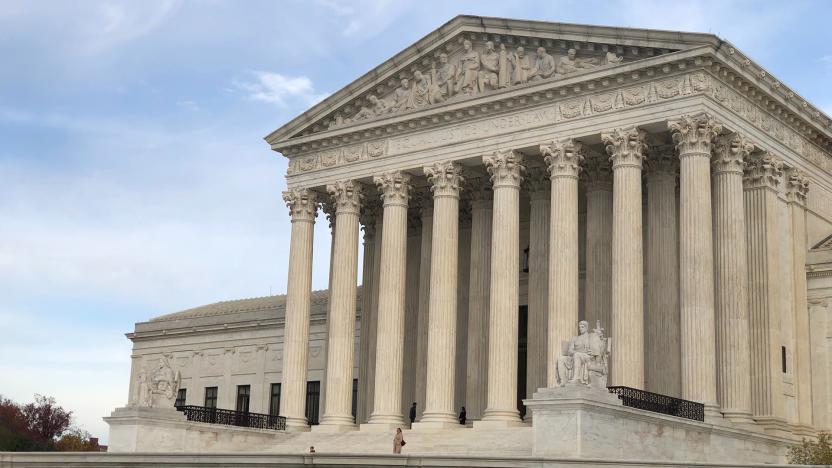
Florida asks Supreme Court to decide fight over social media regulation
Florida has petitioned the Supreme Court to rule on whether states can make social media platforms host speech.
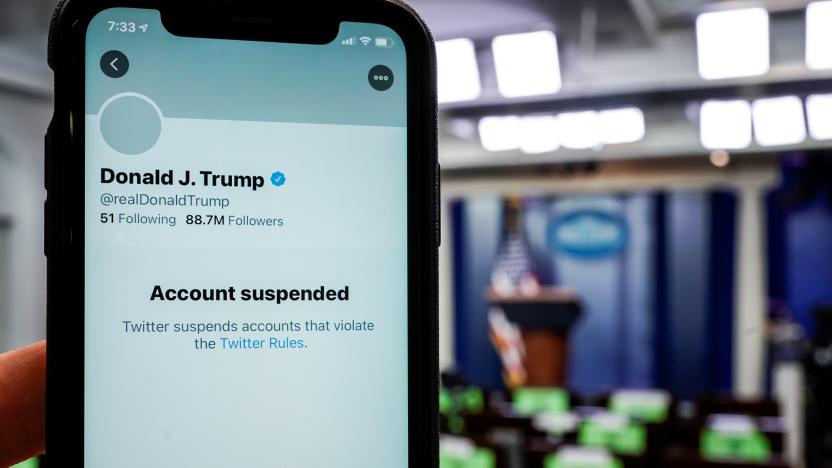
Twitter asks judge to throw out Trump's lawsuit over ban
Twitter has asked a judge to throw out Trump's lawsuit over his ban, calling it a threat to free speech.
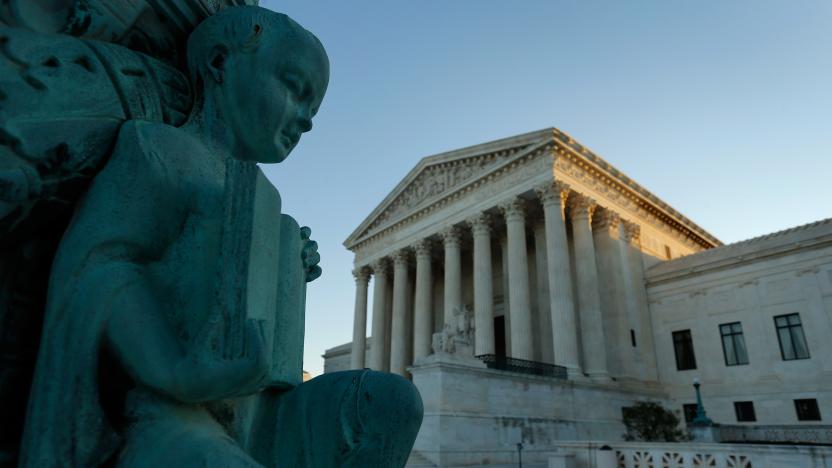
Supreme Court rules that ‘F--- school’ is free speech in student Snapchat case
The Supreme Court ruled today that a high school in Pennsylvania violated a student's First Amendment rights by suspending her from the cheerleading team, following Snapchat posts where she criticized the school with expletives.

Supreme Court vacates ruling that prevented Trump from blocking Twitter critics
Not that it matters too much for Trump anyway after Twitter permanently banned him.
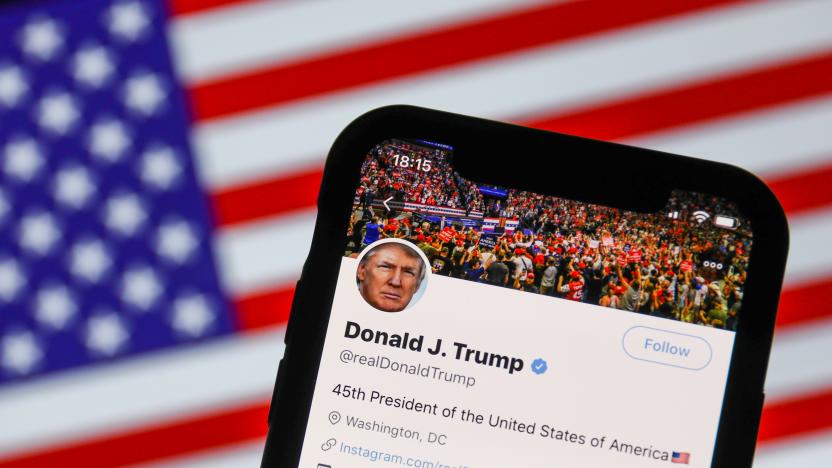
White House calls on Supreme Court to rule on Trump's Twitter blocking
President Trump wants to settle the legal debate around the constitutionality of blocking critics on Twitter for good.
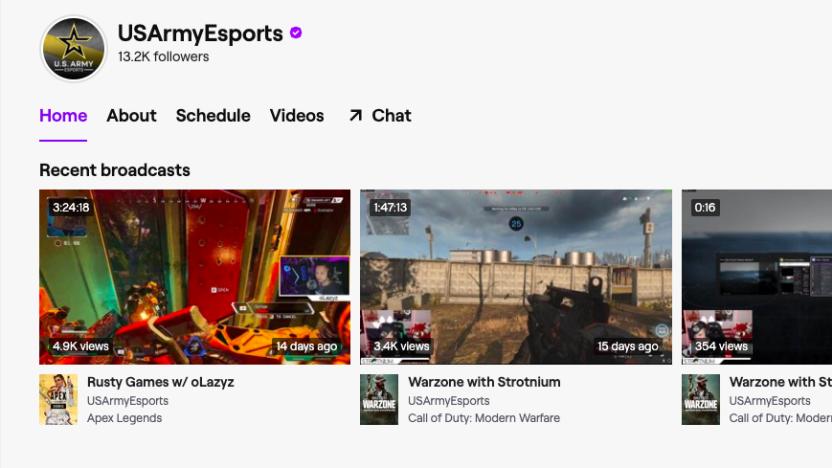
Army pauses recruiting on Twitch after First Amendment criticism
The US Army has paused activity on its Twitch account after drawing criticism from First Amendment groups for banning a user who asked about war crimes during a livestream. The user, activist Jordan Uhl, subsequently wrote an article for The Nation criticizing the Army, Navy and Air Force for using Twitch as a recruitment method. Wednesday, Rep. Alexandria Ocasio-Cortez told Vice she plans to file a measure that would prevent the military from using Twitch and similar platforms for recruiting.

Lawsuit claims Trump's social media order violates free speech rights
President Trump faces a lawsuit asserting that his social media order violates the First Amendment.

Judges toss lawsuit alleging anti-conservative bias on social media
Freedom Watch and conservative YouTuber Laura Loomer had their case -- which alleges social media sites conspired against them -- thrown out again.

Court rejects Trump's ongoing fight to block critics on Twitter
President Trump's attempt to overturn a ruling that prevents him from blocking Twitter critics has been shot down -- at least for now. An appeals court has denied the Trump administration's request for a review of the decision after a majority of judges decided a review wasn't necessary. Circuit Judge Barrington Parker described the original decision as a "straightforward application" of existing actions and precedent. If Trump is going to use his personal Twitter account for official statements (and he does), that account becomes a public forum where critics are allowed to voice their disagreements.
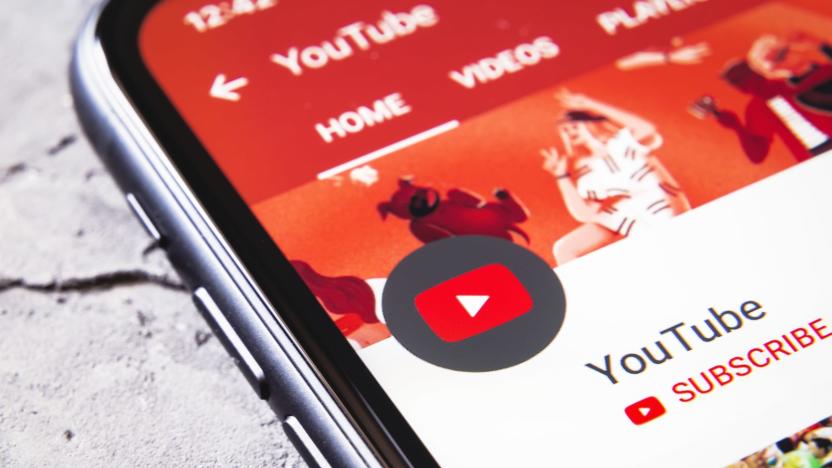
Judges rule that YouTube isn't bound by the First Amendment
A federal appeals court has upheld the dismissal of a lawsuit against Google by PragerU. By coming to that decision, the judges backed the previous court's ruling that internet platforms aren't subject to the free speech requirements of the First Amendment. If you'll recall, Dennis Prager, a conservative radio host and YouTuber who runs the channel PragerU, sued the tech giant in 2017. He accused Google of being biased against conservatives by putting age restriction on his content and blocking third parties from running ads on his videos, which feature conservative viewpoints on topics like abortion, gun rights and Islam.
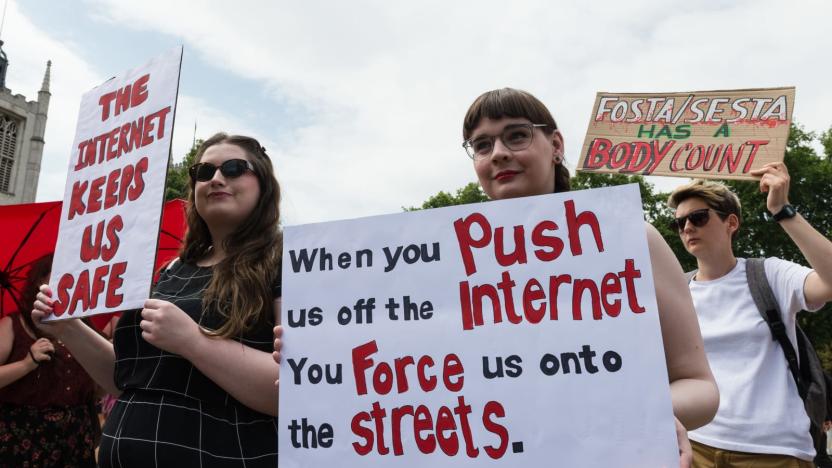
Court reinstates lawsuit challenging online sex trafficking law
Civil liberty advocates are getting a second chance to challenge the legitimacy of the FOSTA-SESTA online sex trafficking law. An appeals court has reinstated a lawsuit claiming that FOSTA-SESTA violates First Amendment protections for free speech. While a judge had previously tossed the lawsuit on the grounds that plaintiffs Alex Andrews and Eric Koszyk didn't face a credible threat of prosecution, the appeals court disagreed. It determined that Andrews faced a real threat due to her sex worker support site, while FOSTA may have harmed Koszyk by denying him the ability to offer therapeutic massages anywhere on Craigslist.

The legal battle over 3D-printed guns is far from over
Last year, Defense Distributed won a legal battle, which allowed it to continue uploading and sharing blueprints for 3D-printed guns. The decision was immediately criticized by states and gun-reform advocates. Now, a US District Judge has overturned the ruling. Once again, it is illegal to publish blueprints for 3D-printed guns online.
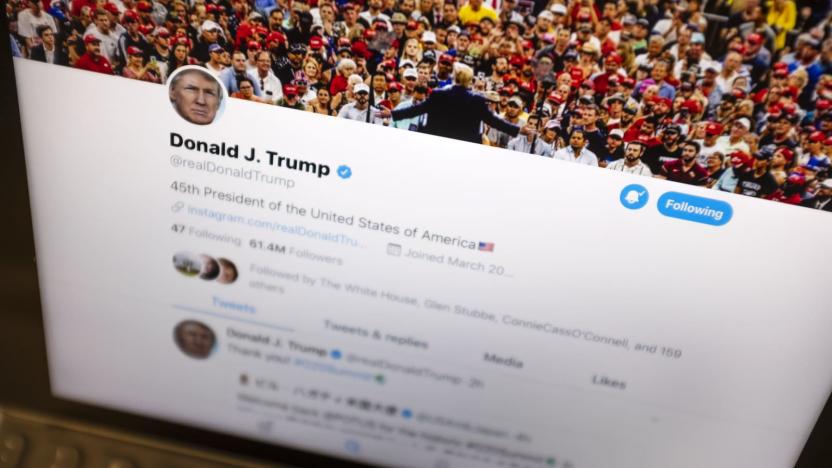
Federal appeals court rules Trump can't ban critics on Twitter
President Trump's desire to block critics on Twitter just hit another snag. A federal appeals court in New York has ruled that Trump is violating the First Amendment by blocking people he disagrees with on the social network. Public officials using social accounts for "all manner of official purposes" aren't allowed to silence people simply because they disagree on a given subject, the judges said.

Appeals court sides with ex-NFL players in Madden likeness suit
A federal appeals court struck down Electronic Arts' appeal to dismiss a 2010 lawsuit in which retired NFL players alleged that the publisher used their likenesses without permission in Madden NFL 09. A three-judge panel unanimously declined EA's motion to dismiss the lawsuit on the grounds of First Amendment protections under "incidental use." Madden 09 included over 140 historic NFL teams as well as the stats and positions of thousands of retired athletes to celebrate the series' 20th anniversary, and EA allegedly altered jersey numbers and removed the players' names to avoid paying licensing fees, according to the August 2010 lawsuit. The judges referred to another recent likeness lawsuit in the opinion, in which former college athletes sued EA in May 2009 over the use of their likenesses in NCAA Basketball and NCAA Football games. EA proposed a $40 million settlement to that lawsuit in September 2013, resulting in those players earning up to $951 for each year their likeness was featured in the games. The publisher added $8 million in expenses related to that lawsuit in May 2014. EA introduced similar First Amendment-based defenses in its appeal for the retired NFL players lawsuit save for one additional argument: That the likenesses were protected under the First Amendment as incidental use. The judges "held that Electronic Arts's use of the former players' likenesses was not incidental because it was central to Electronic Arts's main commercial purpose: to create a realistic virtual simulation of football games involving current and former National Football League teams." The decision upholds a California court's March 2012 dismissal of EA's attempt to prevent the suit from going to court. Among the plaintiffs listed in the lawsuit is Sam Keller, a former Arizona State, Nebraska and Oakland Raiders quarterback that filed the original likeness lawsuit related to the publisher's college sports games. [Image: EA]

Court rules Google can arrange search results any way it wants
With the First Amendment behind it, Google is now free to put search results in whatever order it wants, according to a recent ruling by a US court in San Francisco. The company has been fighting to earn this right for years, but it wasn't until last week that a judge in the Bay Area decided to grant the search giant such a thing, citing freedom of speech as the main influencer in the decision. It all started back when a site known as CoastNews filed a lawsuit arguing that Google was knowingly lowering its rankings in search results; the tech giant supposedly viewed it like a competitor and, thus, didn't want it to succeed. Shortly thereafter, Google quickly answered with an anti-SLAPP motion, which is often used by defendants to guard against litigation that would deter free speech.

The SOPAbox: Defeating online piracy by destroying the internet
Disclaimer: The Soapbox column is entirely the opinion of this week's writer and does not necessarily reflect the views of Massively as a whole. If you're afraid of opinions other than your own, you might want to skip this column. Unless you've been living under a rock, chances are you've heard of SOPA and PIPA. The Stop Online Piracy Act and PROTECT IP Act are two radical pieces of copyright legislation currently being pushed through the US government. Although the stated intent of the new legislation is to provide companies with additional tools with which to combat piracy, the bill's loose wording has raised some serious alarm bells. Opponents to the proposed law say it would give corporations the ability to shut down any almost any website under the guise of protecting copyright infringement. Gamers will be affected worst of all, as the loose wording of the law makes any website with user-submitted content potentially vulnerable to a shut down order. That could include YouTube, Facebook, Twitter, any blog with a comment section, or even any online game with a chat system. Perhaps the scariest part is that you'll be affected even if you're not in the US, as one of the new law's enforcement mechanisms is to remove a site from the DNS records, a move that assumes the US has jurisdiction over the global Domain Name System. AOL is among many huge companies strongly opposing SOPA, and so naturally Massively opposes it too. In this week's massive two-page Soapbox, I make the case for why you should be worried about SOPA, and I suggest what can be done to tackle piracy in the games industry. Comments can be left on page two.

Anonymous declares war on Sony over SOPA support
Sony may once again be the target of hacking attacks, but at least this time the company has a little heads-up in advance. The secretive organization of hackers known as Anonymous released a video declaring its intent to strike at Sony over Sony's support of the controversial Stop Online Piracy Act (SOPA). The video contains your usual vague proclamations of doom and ego-boosting statements, although with Anonymous' past activity, it will be hard to ignore the threat. The collective of hackers were thought to be at least partially responsible for the attack on Sony earlier this year that forced the company to take its network and games offline. SOPA is a proposed U.S. bill that would allow law enforcement to combat pirated digital goods by shutting down websites and blocking payments to site owners. While the bill is supported by Hollywood, the music industry, and some major game companies, SOPA opposers worry that the bill will infringe on First Amendment rights and permanently harm the internet. You can watch the Anonymous declaration after the jump.

Federal domain seizure raises new concerns over online censorship
It's been a little more than a year since the US government began seizing domains of music blogs, torrent meta-trackers and sports streaming sites. The copyright infringement investigation, led by US Immigrations and Customs Enforcement (ICE) authorities, quickly raised eyebrows among many free speech and civil rights advocates, fueling a handful of legal challenges. Few are more compelling, or frightening than a case involving Dajaz1.com. As TechDirt reports, the popular hip-hop blog has been at the epicenter of a sinuous and seemingly dystopian dispute with the feds -- one that underscores the heightening controversy surrounding federal web regulation, and blurs the constitutional divide between free speech and intellectual property protection. Dajaz1 was initially seized under the 2008 Pro IP Act, on the strength of an affidavit that cited several published songs as evidence of copyright infringement. As it turns out, ,any of these songs were actually provided by their copyright holders themselves, but that didn't stop the government from seizing the URL anyway, and plastering a warning all over its homepage. Typically, this kind of action would be the first phase of a two-step process. Once a property is seized, US law dictates that the government has 60 days to notify its owner, who can then choose to file a request for its return. If the suspect chooses to file this request within a 35-day window, the feds must then undertake a so-called forfeiture process within 90 days. Failure to do so would require the government to return the property to its rightful owner. But that's not exactly how things played out in the case of Dajaz1. For more details on the saga, head past the break.

The Lawbringer: Supreme Court decides Brown v. EMA
On June 27, 2011, the Supreme Court of the United States of America ruled that video games fall under the same First Amendment speech protections as books, movies, music, and art. Justice Scalia wrote the opinion, decrying California's attempts to restrict speech as, at the same time, too under-inclusive and too over-inclusive. What does that mean for the video game industry? What does this decision mean for video games in general? Self-regulation, it seems, is doing the job when it comes to keeping parents in charge and violent video games in the hands where they belong. If you have no idea what Brown v. Entertainment Merchants Association (EMA) (formerly Schwarzenegger v. EMA) is about, check out my first Lawbringer feature on the topic as well as Gamasutra's feature, as it is probably the best, concise understanding of the case as it was back in November of 2010. Now, however, we have a decision. After being argued on Nov. 2, 2010, the Supreme Court decided on June 27, 2011, by a vote of 7-2 that the California law banning the sale of violent video games to minors was unconstitutional.











